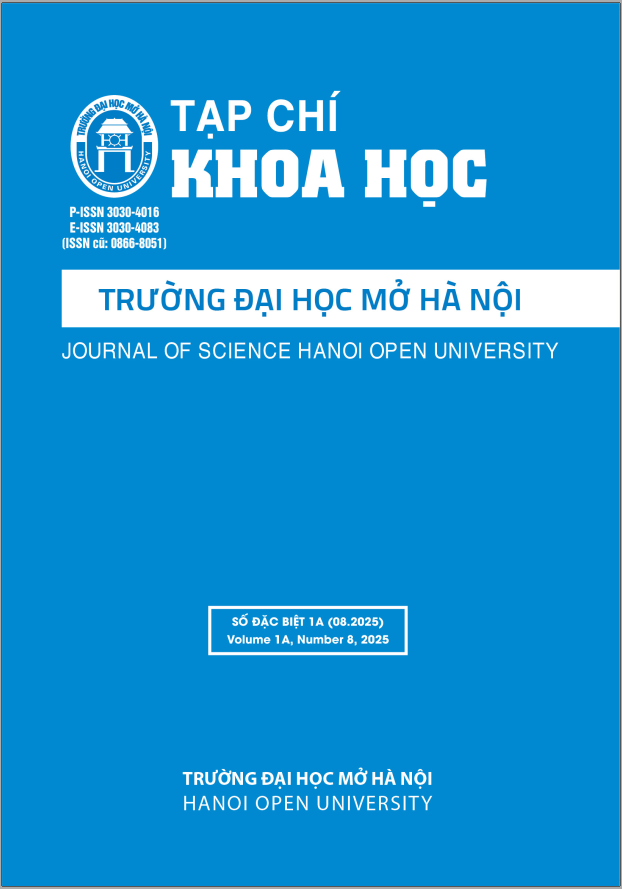TÁC ĐỘNG CỦA HỌC PHẦN THỰC TẬP SƯ PHẠM ĐẾN KỸ NĂNG GIẢNG DẠY TIẾNG ANH CỦA SINH VIÊN KHOA TIẾNG ANH, TRƯỜNG ĐẠI HỌC MỞ HÀ NỘI
DOI:
https://doi.org/10.59266/houjs.2025.619Từ khóa:
Thực tập sư phạm, giáo sinh, kỹ năng giao tiếp, quản lý lớp họcTóm tắt
Nghiên cứu được thực hiện nhằm tìm hiểu về ảnh hưởng của hoạt động thực tập sư phạm đối với kỹ năng giảng dạy Tiếng Anh của sinh viên chuyên ngành ngôn ngữ Anh theo định hướng sư phạm nhìn từ góc độ của sinh viên Khoa Tiếng Anh, Trường Đại học Mở Hà Nội. Phương pháp nghiên cứu định lượng với thang đo Likert năm mức độ được sử dụng để thu tập dữ liệu khảo sát. Kết quả nghiên cứu cho thấy học phần thực tập sư phạm có tác động tích cực đáng kể đến kỹ năng giao tiếp và kỹ năng quản lý lớp học của các giáo sinh, trong đó khả năng truyền đạt, năng lực sử dụng các phương pháp giao tiếp khác nhau trong lớp học, quản lý thời gian và sử dụng các biện pháp phản hồi tích cực được các giáo sinh đánh giá có sự thay đổi rõ rệt sau kỳ thực tập.
Tài liệu tham khảo
[1]. Albert, C. & Davia, M. A. (2018). “Job search strategies and underemployment in recent graduates’ first jobs in Spain”, Revista de Economıa Aplicada, 26 (78), 21-41.
[2]. Bee, M. (2012). The importance of communication skills in teaching: A classroom perspective. Journal of Educational Psychology, 104(3), 527-542.
[3]. Charmel, M. J. (2017). Developing students’ employability skills through internships. Business Education & Accreditation, 9(2), 99-109
[4]. Darling-Hammond, L. (2017). Empowered Educators: How High-Performing Systems Shape Teaching Quality. Jossey-Bass.
[5]. Deming, D. J. (2017). The growing importance of social skills in the labour market. The Quarterly Journal of Economics, 132 (4), 1593-1640
[6]. Dicke, T., J. Elling, A. Schmeck, & Leutner, D. (2015). Reducing Reality Shock: The Effects of Classroom Management Skills Training on Beginning Teachers. Teaching and Teacher Education, 48: 1-12. doi: 10.1016/j.tate.2015.01.013.
[7]. Evertson, C. M., & Weinstein, C. S. (2006). Classroom Management as a Field of Inquiry.” In Handbook of Classroom Management: Research Practice, and Contemporary Issues, edited by C. M. Evertson and C.S. Weinstein, 3-16. Mahwah, New Jersey: Lawrence Erlbaum Associates Publishers.
[8]. Kolb, D. A. (1984). Experiential Learning: Experience as the Source of Learning and Development. Englewood Cliffs, NJ: Prentice Hall.
[9]. Luthfi, A. (2022). International Teaching Internship: Development of Pre-Service Teachers’ Competences. The Qualitative Report. Advance online publication.
[10]. Marzano, R. J., J. S. Marzano, & D. J. Pickering. (2003). Classroom Management that Works: Research- based Strategies for Every Teacher. Alexandria, Virginia: Association for supervision and curriculum development.
[11]. Mohammad, A., & Al-azzawi, L. (2023). Enhancing classroom management through reflective during teaching internships. Journal of Teaching and Learning, 15(2), 76-89.
[12]. Moriarty, S. E., & Rickard, B. J. (2018). Experiential learning through internships: Insights from a national study. Communication Teacher, 32(2), 103-119.
[13]. Potari, D., & Chapman, O. (2020). In Knowledge, beliefs, and identity in mathematics teaching and teaching development. International handbook of mathematics teacher education (Vol. 1). Brill.
[14]. Saunders, G., & Mills, K. (1999). Teacher communication skills and classroom interaction: Insights from experienced educators. Teaching and Teacher Education, 15(1), 99-111.
